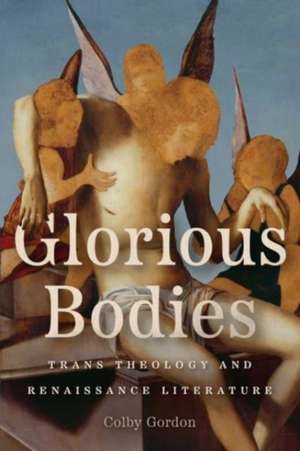Glorious Bodies: Trans Theology and Renaissance Literature
Autor Professor Colby Gordonen Limba Engleză Paperback – 4 sep 2024
In this striking contribution to trans history, Colby Gordon challenges the prevailing assumption that trans life is a byproduct of recent medical innovation by locating a cultural imaginary of transition in the religious writing of the English Renaissance. Marking a major intervention in early modern gender studies, Glorious Bodies insists that transition happened, both socially and surgically, hundreds of years before the nineteenth-century advent of sexology. Pairing literary texts by Shakespeare, Webster, Donne, and Milton with a broad range of primary sources, Gordon examines the religious tropes available to early modern subjects for imagining how gender could change. From George Herbert’s invaginated Jesus and Milton’s gestational Adam to the ungendered “glorious body” of the resurrection, early modern theology offers a rich conceptual reservoir of trans imagery.
In uncovering early modern trans theology, Glorious Bodies mounts a critique of the broad consensus that secularism is a necessary precondition for trans life, while also combating contemporary transphobia and the right-wing Christian culture war seeking to criminalize transition. Developing a rehabilitative account of theology’s value for positing trans lifeworlds, this book leverages premodern religion to imagine a postsecular transness in the present.
| Toate formatele și edițiile | Preț | Express |
|---|---|---|
| Paperback (1) | 169.87 lei 3-5 săpt. | +14.82 lei 4-10 zile |
| University of Chicago Press – 4 sep 2024 | 169.87 lei 3-5 săpt. | +14.82 lei 4-10 zile |
| Hardback (1) | 675.96 lei 6-8 săpt. | |
| University of Chicago Press – 6 sep 2024 | 675.96 lei 6-8 săpt. |
Preț: 169.87 lei
Nou
Puncte Express: 255
Preț estimativ în valută:
32.51€ • 33.58$ • 27.06£
32.51€ • 33.58$ • 27.06£
Carte disponibilă
Livrare economică 04-18 martie
Livrare express 15-21 februarie pentru 24.81 lei
Preluare comenzi: 021 569.72.76
Specificații
ISBN-13: 9780226835006
ISBN-10: 0226835006
Pagini: 272
Dimensiuni: 152 x 229 x 18 mm
Greutate: 0.39 kg
Ediția:First Edition
Editura: University of Chicago Press
Colecția University of Chicago Press
ISBN-10: 0226835006
Pagini: 272
Dimensiuni: 152 x 229 x 18 mm
Greutate: 0.39 kg
Ediția:First Edition
Editura: University of Chicago Press
Colecția University of Chicago Press
Notă biografică
Colby Gordon is associate professor in the Department of Literatures in English at Bryn Mawr College.
Cuprins
Introduction. A Trans Crux
1. A Woman’s Prick: Trans Technogenesis in Sonnet 20
2. Abortive Hedgehogs: Prodigies and Trans Animality in The Duchess of Malfi
3. Egg Theory’s Early Modern Style; Or, John Donne’s Resurgent Flesh
4. Trans Mayhem in Samson Agonistes
Epilogue. The Final Crux: A Nonsecular Transition
Acknowledgments
Notes
Bibliography
Index
1. A Woman’s Prick: Trans Technogenesis in Sonnet 20
2. Abortive Hedgehogs: Prodigies and Trans Animality in The Duchess of Malfi
3. Egg Theory’s Early Modern Style; Or, John Donne’s Resurgent Flesh
4. Trans Mayhem in Samson Agonistes
Epilogue. The Final Crux: A Nonsecular Transition
Acknowledgments
Notes
Bibliography
Index
Recenzii
“Beginning with its unexpected scrutiny of Holinshed’s Chronicles, Glorious Bodies reveals a trans imaginary underpinning the theology of Shakespeare’s Sonnet 20, Webster’s animal prodigies, Donne’s resurrected bodies, and Miltonian biopolitics. With creativity, verve, and wit, Gordon masterfully—indeed gloriously—demonstrates the stakes of trans studies for early modern studies writ large.”
“In this field-transforming book, Gordon accomplishes a double tour de force. He compellingly resurrects the trans-affirming capacity of many early modern theological categories explored in English literary works, thereby reclaiming trans life in our own moment as what it has always been: a sacred matter. Simultaneously, he shows how those categories’ enmeshment in early modern white world-making curtails their radical potential. Gordon’s gloriously intersectional vision of early modern trans studies is a revelation.”
“Glorious Bodies shows what’s possible when trans scholars write for trans readers. This book is ambitious in its scope, provocative in its style, and convincing in its claims—and, as Gordon makes clear, it is timely and urgent. We must consider carefully the terrain mined by transphobic thinkers—theology—and not concede its ground.”
“Glorious Bodies is a field-changing, original contribution to early modern literary and cultural studies, queer and trans studies, and the histories of religion and political theology. Gordon presents the trans potentials in religious texts in the full complexity of their contexts and erasures, and the book is successful not only in making a compelling case to bring theology back into premodern trans studies, but also in showing the urgent relevance of premodern trans studies for the current political moment.”
